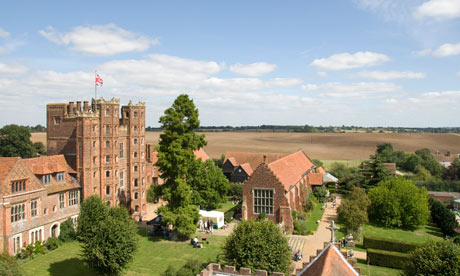
Places to stay
Considering the size of the county, decent five-star hotels of the country house or boutique variety are somewhat thin on the ground in Essex, with the notable exception of Maison Talbooth (01206 322367, milsomhotels.com/maison, doubles from £230 B&B) near Dedham, which has opulent rooms and an outdoor heated pool. Last year's opening of the Lifehouse spa resort (01255 860050, lifehouse.co.uk, full-board one-night spa break from £175pp), near Thorpe-le-Soken, has been a welcome addition to the hotel scene. Spa treatments, gym and swimming pool aside, the contemporary rooms, fab restaurant and beautifully landscaped gardens make it a great place to recharge your batteries.
What Essex lacks in destination hotels, it makes up for with good country inns. The Crown in Stoke by Nayland (01206 262001, crowninn.net, doubles from £120 B&B) was recently given a contemporary makeover and is a great base for exploring Constable country. Or, if you fancy an otherworldly and unforgettable experience, book one of the quaint wooden cottages on Osea Island (07810 753226, oseaisland.co.uk, one week at the Sweet Shop, sleeps two, costs from £263), a private island owned by the record producer Nigel Frieda which opened to the public for the first time this year. Osea, in the Blackwater estuary, is cut off by the tide most of the time – it can be reached by causeway just twice in every 24 hours, giving a wonderful sense of peace and isolation.
Glamping
One of the more amusing episodes of TOWIE saw the cast go "glamping" (complete with skyscraper heels, leopard-skin suitcases and a pink inflatable armchair). But don't let that put you off: the chic camping revolution has not passed Essex by. At Bouncers Farm (01275 395447, tinyurl.com/gypsycamp, from £180 for two nights in October) near Wickham Bishops, you can stay in one of four authentic Gypsy wagons in a peaceful orchard setting. Owner Ann Bishop consulted with local Gypsies to get the details right, so each wagon comes with its own traditional willow "bender" tent for cooking and socialising, and she'll even pick you up from Witham station in a horse-drawn carriage.
Or you can camp in style in one of six safari-style tents in the grounds of Layer Marney Tower (01420 549150, tinyurl.com/layermarney, three-night breaks from £310 for an encampment sleeping up to seven) near Tiptree. This impressive Tudor gatehouse was built in the 16th century and is one of the most underrated historic buildings in the country, perhaps because of its out-of-the-way location. The six cosy encampments are named after the wives of Henry VIII who may (or may not) have visited the tower, and each comes with a wood-heated hot tub, an outdoor stoves and a firepit for toasting marshmallows.
Wild places
Nature writer Robert Macfarlane, author of The Wild Places, called Essex that "most maligned of English counties", citing in its defence its 350 miles of coastline, and its medieval field systems, grazing marshes and ancient woodlands, among the best-preserved in Britain. Some of the most rewarding places to experience wildlife are the river estuaries – remote and atmospheric places such as the Dengie peninsula and the Stour Woods, great for wild flowers and wading birds. Take a kayak out with local bushcraft expert James Linford (07769 716674, jameslinford.co.uk) for a circumnavigation of Mersea Island with an overnight wild camp (£95, not including food), or a day's tour of the Walton Backwaters with a visit to a seal colony (£98) and you'll find it hard to believe you are just an hour from London. Alternatively you can take a birdwatching cruise from Maldon or Brightlingsea on a traditional Thames sailing barge (01621 857567, top-sail.co.uk, £45 for a day's cruise including food). In Hainault, Epping, and Hatfield Forest near Stansted you'll find some of the country's most ancient woodlands, made accessible with family-friendly events and walks. For details of walking and cycling trails see visitessex.com/what-to-do/Walk_and_Cycle_Essex.aspx.
Food and drink
If there's one thing the people of Essex know about, it's seafood. The Colchester Native Oyster was first farmed off the Blackwater Estuary by the Romans and you can sample this local delicacy on Mersea Island at simple wooden seafood shacks such as The Company Shed (01206 382700, the-company-shed.co.uk, £14 a dozen). Another popular weekend spot is Leigh-on-Sea, where cockle sheds that have been in the same families for generations serve up the local shellfish in polystyrene tubs with white sliced bread on the side (oldleigh.com/cocklesheds.html, from £2 for a small carton). Another legacy of the Romans is the county's vineyards, most of which offer tours and tastings. One of the largest is New Hall Vineyards in Purleigh (no phone, newhallwines.co.uk), which is open daily for free visits to the vineyards and wine tasting.
Art and culture
Essex has a thriving arts scene and many small galleries, particularly around the fishing town of Maldon, but until now it has lacked a flagship venue. That's all set to change on 25 September with the opening of Firstsite (01206 577067, firstsite.uk.net) a major new centre for the visual arts in a striking crescent-shaped building in Colchester. Camulodunum (free admission), which takes its title from the original Roman name of Colchester, is the first exhibition and will feature artworks by Ai Weiwei, Barbara Hepworth, Henry Moore and Andy Warhol. For details of art trails, open studios, small galleries and sculpture events, most of which will be running until the end of October, see visitessex.com/discover/cultural/summer-of-art/default.aspx.

